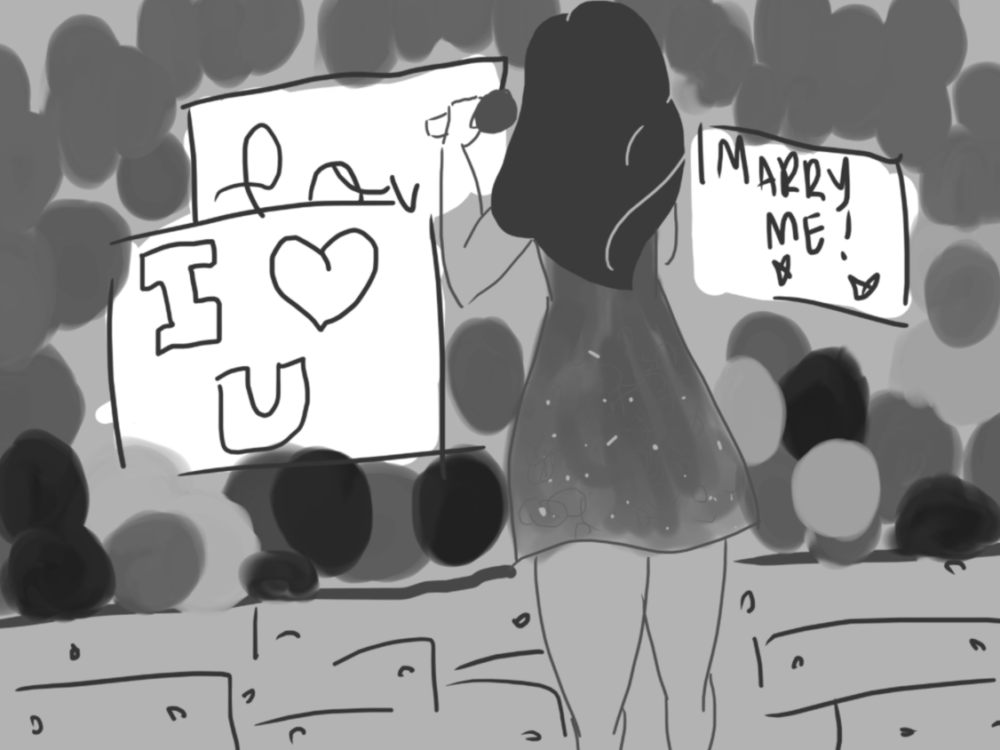
By Timothy Roe, Staff Writer
Forming relationships with people you’ve never met or people who don’t even exist might seem a strange thought, but such a bond occurs much more frequently than you’d expect. In fact, it happens to anyone who watches movies, TV shows, cartoons, sports and other media. It’s called a parasocial relationship: one-sided relationships in which a person becomes emotionally invested in another party who is completely unaware of the other’s existence.
The term was first coined in 1956 by Donald Horton and R. Richard Wohl, stating that mass media and the personalities associated with them “give the illusion of face-to-face relationship with the performer.” This illusion is strengthened when the performer directly focuses on the camera, making the relationship feel personal and special to the hundreds of thousands of people watching the program. Even so, simply watching people converse in a tv show brings a feeling of intimacy similar to face-to-face interactions. The line between the persona (the figure performers choose to show to their audience) and the actual person behind it begins to blur as they are more familiarized to the audience. The persona’s role, however, is most often to create intimacy–usually, the person we observe and know isn’t the actual person. It’s a role he/she is expected to play, such as a pop star, comedian, actor, or simply part of his/her personality that exempts heavy flaws.
Parasocial relationships are generally normal and desirable to the media consumer, providing emotional comfort and a dependable escape from real life relationships; it’s similar to being with a friend or a group of friends you don’t need to respond to. Additionally, the consumer is the one who chooses who to bond with, the performer having a reliably stable personality ready at every moment. If the performer is unlikable, we can choose to stay away from him/her; after all, there is no drawback to doing so. If he/she presents a favorable personality, we choose to develop a bond; in turn, this bond is strengthened as we learn more about them: their preferences, emotions, experiences, problems, etc. We begin to believe that we understand these individuals on a deep level, and that through the similarities shared, a relationship of friendship and love is truly present–even though the other party knows absolutely nothing about us.
The problem that arises from this is simple: performers need to bond with their audience in order to foster their careers. The intensity of an emotional bond equates with the degree of loyalty within that bond. By catering towards the audience’s emotional needs, they then feel obligated to the performer to give something in return. In comic Bo Burnham’s satirical music video “Repeat Stuff,” he emphasizes the predatory intent of certain artists to emotionally appeal to a passionate, youthful audience. It’s easy to capitalize on the emotional wreck of teenhood, making the audience feel special through vague and overgeneralized statements.
From “Repeat Stuff”:
“I also hope that you don’t see through
this cleverly constructed ruse
designed by a marketing team
cashing in on puberty and low self-esteem,
and girls’ desperate need to feel loved.”
…
“I love your hands ‘cause your fingerprints are like no other,
I love your eyes and their bluish- brownish- greenish- color
I love it when you smile that you smile wide,
And I love how your torso has an arm on either side.”
Let me emphasize at this point that performers without malicious intent are entirely passable–good even, giving people an escape from the stresses of everyday life. Ripping money from people’s emotions is a completely different story, though; look out for it, and don’t let it happen to you.
On the flip side of parasocial relationships exist the dangers toward the performer. Radical situations, such as stalkers and the like, are certainly threatening and detrimental to the performer–though, what may be worse for him/her is pressure. Dishing out love towards performers born from parasocial relationships also encompasses a certain expectation for them. The audience begins to need the performer in their lives. There develops an expectation for the performer to produce more and connect more with the audience. Especially so for highly empathetic people, the expectations the audience holds for performers chain them down to their occupations. The more the audience depends on the performer, the greater the pressure is to not let them down. And oftentimes, carrying the burden of having thousands of minds on you every day is just a bit much.
With Twitter, Facebook and other social media, it’s easy for parasocial relationships to get out of hand. There’s a rope of love that gets pulled tighter every time we find another reason to bond in a new tweet or post. And love is a dangerous emotion–save it for the people you know, not the people you think you know. Otherwise, it can wreck you for someone who’s never even seen your face. Instead, love the product. That product–a piece of music, a movie, a TV show–is always there, and should be connected with. The parasocial relationship between performer and audience shouldn’t reach that extremity of love; rather, something milder yet still strong; something that doesn’t drag you up and down and side to side, but lifts you with inspiration. Something like respect.





